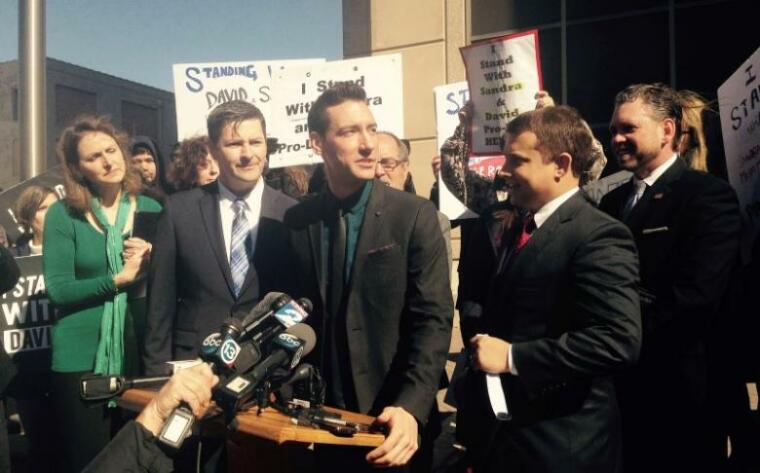Ninth Circuit hears arguments regarding footage of baby parts for sale

Judges, pro-life investigators and abortion industry organizations presented arguments before the U.S. Court of Appeals for the Ninth Circuit on Tuesday regarding the release of videos that exposed Planned Parenthood's alleged sales of baby parts.
According to The Recorder, the pro-life group Center for Medical Progress (CMP) signed confidentiality agreements before it infiltrated the annual meetings of National Abortion Federation (NAF) to record secret footage. CMP claimed that the video showed abortion providers discussing the sale of fetal organs.
The court is expected to decide whether the injunction blocking the release of the videos should be permanent or not.
Last February, U.S. District Judge William Orrick III of the Northern District of California issued a preliminary injunction against the release of the videos. The injunction required law enforcement to go through a subpoena process in order to view the footage.
Marc Hearron, an attorney for NAF, believed that the district judge made the right decision but two judges from the panel were not convinced.
"What if there was a video that showed that a full-term baby that was born and the physician put its hand over the child's mouth?" Judge Consuelo Callahan asked Hearmon. "I'm very concerned that you seem to be saying that they can't go to the police," he continued.
Hearron tried to point out that the main goal of CMP was to release the videos online and not to surrender them to the authorities. Judge Andrew Hurwitz replied that the group has been "dying to" turn the videos over to law enforcement.
Brunn Roysden of the Arizona Attorney General's office argued that Orrick was mistaken in limiting the ability of law enforcement to gather evidence. He said that his office was able to obtain a footage but it could have accessed it sooner without the restriction.
Catherine Short of the Life Legal Defense Fund, stated that the confidentiality agreements should not hinder individuals from releasing information in the name of public interest, providing that it was not classified.
"What standing do you have to represent the public's right to know as opposed to your client's right to speak?" Hurwitz asked in return.
According to a public information officer that spoke to LifeSiteNews, the ruling will be handed down after several meetings. In one of the meetings the judges will discuss the decision and assign who will write the court's opinion. The judges will meet again to agree on the wording of the written opinion.
 Christians don't have to affirm transgenderism, but they can’t express that view at work: tribunal
Christians don't have to affirm transgenderism, but they can’t express that view at work: tribunal Archaeology discovery: Medieval Christian prayer beads found on Holy Island
Archaeology discovery: Medieval Christian prayer beads found on Holy Island Presbyterian Church in America votes to leave National Association of Evangelicals
Presbyterian Church in America votes to leave National Association of Evangelicals Over 50 killed in 'vile and satanic' attack at Nigerian church on Pentecost Sunday
Over 50 killed in 'vile and satanic' attack at Nigerian church on Pentecost Sunday Ukrainian Orthodox Church severs ties with Moscow over Patriarch Kirill's support for Putin's war
Ukrainian Orthodox Church severs ties with Moscow over Patriarch Kirill's support for Putin's war Islamic State kills 20 Nigerian Christians as revenge for US airstrike
Islamic State kills 20 Nigerian Christians as revenge for US airstrike Man who served 33 years in prison for murder leads inmates to Christ
Man who served 33 years in prison for murder leads inmates to Christ


 Nigerian student beaten to death, body burned over ‘blasphemous’ WhatsApp message
Nigerian student beaten to death, body burned over ‘blasphemous’ WhatsApp message 'A new low': World reacts after Hong Kong arrests 90-year-old Cardinal Joseph Zen
'A new low': World reacts after Hong Kong arrests 90-year-old Cardinal Joseph Zen Iran sentences Christian man to 10 years in prison for hosting house church worship gathering
Iran sentences Christian man to 10 years in prison for hosting house church worship gathering French Guyana: Pastor shot dead, church set on fire after meeting delegation of Evangelicals
French Guyana: Pastor shot dead, church set on fire after meeting delegation of Evangelicals ‘Talking Jesus’ report finds only 6% of UK adults identify as practicing Christians
‘Talking Jesus’ report finds only 6% of UK adults identify as practicing Christians Mission Eurasia ministry center blown up in Ukraine, hundreds of Bibles destroyed: 'God will provide'
Mission Eurasia ministry center blown up in Ukraine, hundreds of Bibles destroyed: 'God will provide' Church holds service for first time after ISIS desecrated it 8 years ago
Church holds service for first time after ISIS desecrated it 8 years ago Burger King apologizes for 'offensive campaign' using Jesus' words at the Last Supper
Burger King apologizes for 'offensive campaign' using Jesus' words at the Last Supper Uganda: Muslims abduct teacher, burn him inside mosque for praying in Christ’s name
Uganda: Muslims abduct teacher, burn him inside mosque for praying in Christ’s name